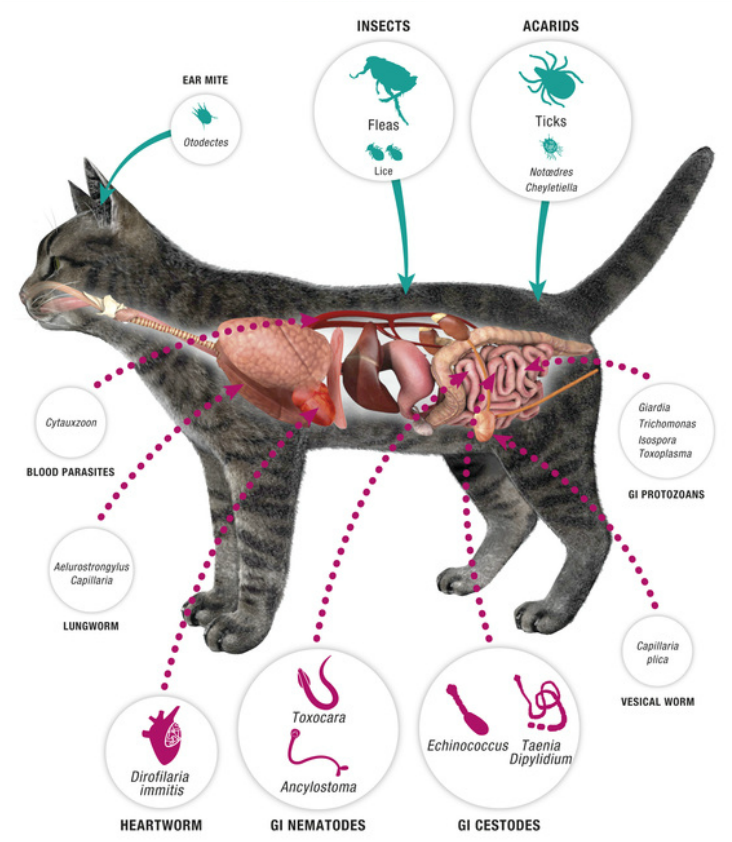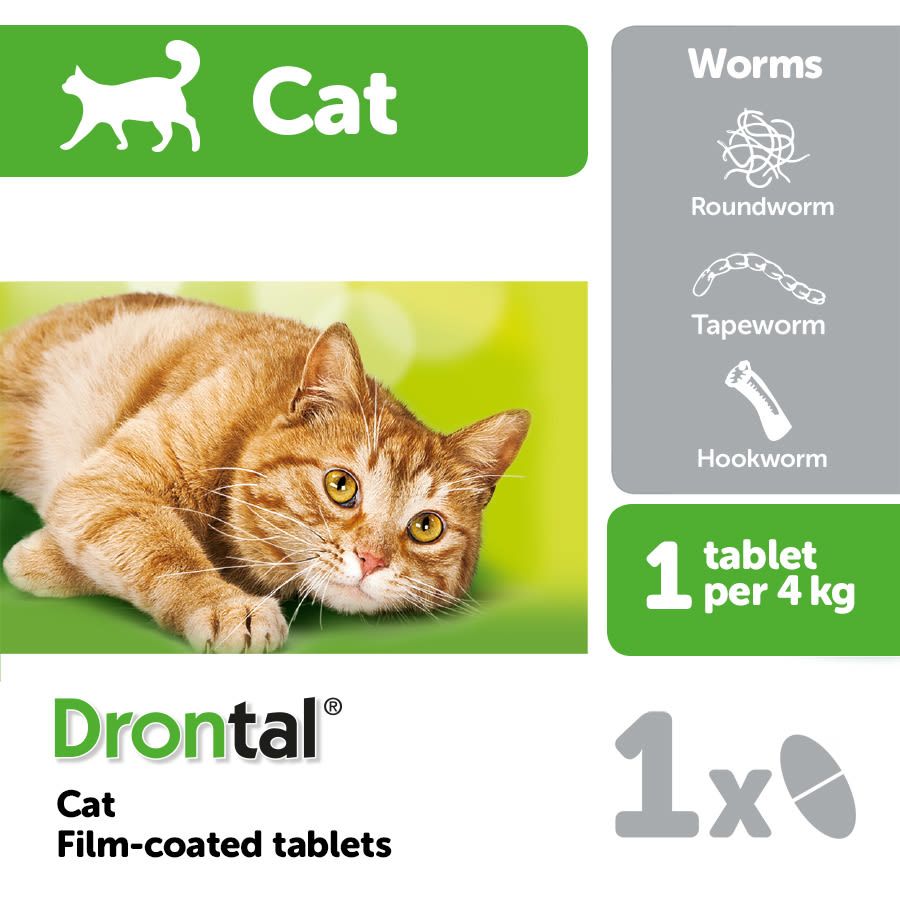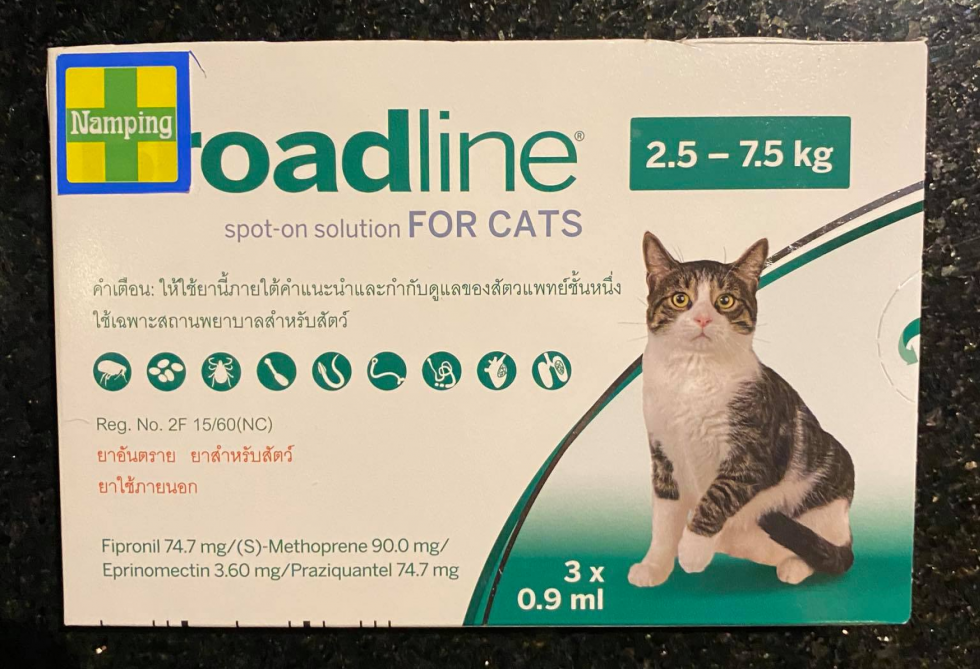When to vaccinate, worm and flea your cat
The most important thing you can do as a new cat owner is to have a preventative health program for your new family member, to protect your cat in the years ahead.
Whether you adopt a kitten or an adult cat, it’s important to get them fully vaccinated against common diseases, and to maintain a regular schedule for treatments to prevent parasites like fleas, worms and ticks.
Another important part of successful preventative health is getting your cat neutered as soon as they are old enough, which has numerous health benefits.
You can use this guide to gain a better understanding of how to vaccinate, worm and flea your cat — but you should always consult your vet for specific professional advice based on your cats age, health and medical history.
Vaccinating your pet cat in Chiang Mai
Understanding vaccinations for your pets can be difficult if you’ve never done it before, but once you read this article, you’ll have all of the information you need about which vaccinations are most common for cats in Thailand, and how to plan for them.

The following three vaccines are ones that are generally recommended for all cats living in Chiang Mai. You’ll need to visit your vet to get these vaccinations.
Core vaccine
This vaccination protects your cat against:
- Rhinotracheitis (respiratory)
- Calcivirus (respiratory)
- Panleukopenia (gastrointestinal)
To protect your cat from these diseases, you’ll need to vaccinate them three times during the first year, 4 weeks apart. Once this initial vaccination has taken place, you just need to give you cat one booster each year.
Rabies vaccine
The rabies vaccine protects against the rabies virus only, and is a recommended vaccination for cats living in Thailand.
- Vaccinate after 12 weeks of age, not earlier
- For the first year, vaccinate two times, 4 weeks apart
- Then take your cat for one booster vaccination each year of life afterwards
FeLV vaccine
This vaccine protects against Feline Leukemia Virus (FeLV). Your cat must first be tested for FeLV and have a negative result before your vet is able to vaccinate them for FeLV.
- Vaccinate in the first year 2 times, 4 weeks apart
- Then follow up with a single booster vaccination each year of life afterwards
What about FIP and FIV vaccines?
A commercial vaccine is available to help protect against FIP. It can only be given to kittens over 16 weeks of age and is mainly used for households with large numbers of cats. The vaccine is considered by many experts to have little to no value, so it’s not listed as one of the three recommended vaccines above.
Similarly, the FIV vaccine is thought to offer minimal protection while having more unwanted side-effects. For this reason it is not widely available in all countries.
Keeping vaccination records
We recommend keeping a single vaccination book for each cat, and keeping this up to date so that you maintain a proper vaccination schedule. If you miss appointments for the initial vaccinations, you may be required to start again, which would result in more cost and vet trips. You also need to maintain annual boosters to ensure you don’t need to re-vaccinate your cat.
When adopting a cat, it’s important to ensure you get as much information as possible about their medical history, as well as their vaccination records. When adopting a cat with Adopt Meow, we provide all of this information for you. If you adopt a cat from somewhere else and struggle to get this information, the best thing to do is speak to your vet to get proper advice based on the age and health of your cat.
Side effects
Giving vaccinations to your cat is a very fast procedure and your cat can go home straight away afterwards. Some cats do experience minor side effects such as a slight fever or feeling a little under the weather for a day afterwards. For this reason, you vet may recommend a staggered schedule to ensure you don’t give your cat too many vaccines on the same day.
Once you get your cat home after being vaccinated, all you need to do is keep an eye on them, and give them some extra cuddles and attention! 🐈
Preventing parasites: fleas, ticks and worms
As with vaccinations, the best way to deal with parasites is to take preventative measures, rather than to wait until your cat has fleas or worms, and then treat the problem.
Parasites are indeed common in cats, especially those that go outdoors, and they can be treated quite easily. But they can also bring other health concerns and carry diseases, so it’s always best to take preventative measures. Parasites can be external and internal, here’s a quick guide:

Flea treatment
There are topical (spot on) treatments available that prevent most external parasites, as well as some internal parasites. Treatments like Revolution, Advocate and Bravecto are common examples. They are really easy to give your cat, by placing the solution on the skin on the back of your cats neck.

Most treatments of this nature can be used once per month, once your cat is old enough. Speak to your vet to find out which treatment is recommended, and what dosage your cat requires. If your cat is an indoor/outdoor cat then using a monthly spot-on treatment is advised.
The most important thing to note is that you should never use treatments that are made for dogs on your cat. This can be fatal.
Remember, these treatments are for preventative care. By maintaining a regular treatment schedule, you’ll be able to vastly reduce the chances of your cat having fleas and other parasites, which is the most important factor for their overall health. It’s also a good idea to get yourself a flea comb so that you can check your cat regularly. Most cats love being combed, so it’s a great opportunity to bond as you check the health of their skin and fur.
Deworming
A kitten should start receiving dewormer at 2 weeks of age and continue every 2 weeks until 12 weeks of age. If your kitten or cat has never been dewormed, no matter what age, it should follow a series of 6 deworming treatments all 2 weeks apart. After your cat or kitten has received this initial series, they can move on to be dewormed monthly to once every 3 months. It is recommended that cats who are living outdoor fully or part-time be dewormed once monthly. Cats and kittens living indoor fully can be dewormed less (every 3 months).
Some of the best spot on treatments for external parasites like fleas and ear mites (Revolution, Advocate) also prevent a variety of internal parasites, like heartworm, hookworm, and roundworm. However, many of them won’t cover your cat for preventative treatment of tape worm.
One of the most common treatments for tapeworm is Drontal, which is an oral medication (pill) that protects against three types of internal worm parasites. This can be given to cats 6 weeks of age and older.

Kittens are particularly at risk when it comes to worms. In fact, most kittens are born with worms which are contracted through their mother via breastfeeding. For kittens under 6 weeks, who cannot receive Drontal, we recommend using a liquid suspension called Parax. This can be administered to kittens 2-6 weeks of age at a vet. Parax covers hookworms and roundworms, but does not cover tapeworms.
All in one parasite treatments
There are some new spot-on treatments available that treat all parasites. These are generally more expensive than using Revolution + Drontal, but are much more convenient. Broadline for Cats is one example of a spot-on treatment which covers all parasites. This can be purchased in Chiang Mai from stores like Namping, based on the weight of your cat.

But as always, for proper advice we recommend asking your vet what they would recommend for your cats particular situation.

When should I give my cat parasite treatments?
It’s always best to get specific advice from your vet about what treatments to give your cat and when. However, you can also use this guide to understand roughly what is recommended.
Kittens
- Kittens 2 weeks and older should start receiving liquid dewormer for hookworms and roundworms.
- Once the kitten is 6 weeks of age you can start administering Drontal which also covers tapeworms.
- At 8 weeks you can buy kitten specific versions of spot-on treatments, or base it on the weight of the kitten. Speak to your vet or pharmacist for advice.
Adults
- All adult cats are recommended to have preventative parasite treatments, either using a spot-on + Drontal tablet (cheaper) or an all-in-one spot on treatment (more expensive).
- It is recommended that you deworm your cat every 1-3 months depending on their access to outdoors.
- It is recommended that you use spot on flea protection on a monthly basis if your cat goes outside, even for short periods. If you have an indoor only cat that does not come in contact with other outside animals, use as prescribed by your veterinarian or as needed.
- Make sure you are giving the correct dosage based on the weight of your adult cat. If you’re unsure, ask your vet.
Summary
We’ve discovered the importance of vaccinating your cat, and maintaining regular preventative parasite treatment. You should now have a good idea of how this all works and what to expect, so you can speak with your vet about your cats treatments with confidence!
We hope you have found our articles useful. All of our education and advice is available for free, wherever you are in the world.
As a charity we rely on donations to allow us to continue helping cats in our local community, and to keep updating this site with useful information.
Any donation to support our work at Adopt Meow is greatly appreciated.





